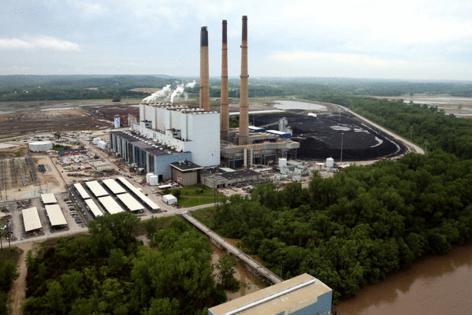Ameren coal plant is top polluter. Labadie emits more SO2 than any in US
Published in Business News
ST. LOUIS — The region's largest coal plant, the Labadie (Missouri) Energy Center, last year emitted far more of a major air pollutant than any plant in the country, a Post-Dispatch analysis has found.
Companywide, the St. Louis-based electric utility Ameren, which owns Labadie, produced more of the pollutant sulfur dioxide than all but one other U.S. utility, according to the analysis of Environmental Protection Agency data.
And while local experts were unaware of research on impacts of so much sulfur dioxide around St. Louis, at least one national study, published in November, links coal plant pollution to thousands of deaths each year.
"It's very disheartening," said Jay Turner, a professor of engineering at Washington University who focuses on air pollution issues. "That just shows how much coal they're burning."
Indeed, critics say the data highlight two key points: First, that Ameren still produces more than half its power from coal-burning plants, and should hurry efforts to use cleaner energy sources. And, second, that the company's largest plants, such as Labadie, in Franklin County, aren't fitted with pollution controls called "scrubbers" that are now common across the country.
The issue has stoked years of concerns among environmentalists and watchdogs. But it has become more public in recent years, as the company fought in court against regulators aiming to force Ameren to curb emissions at its second-largest plant, the Rush Island Energy Center, 50 miles south of St. Louis along the Mississippi River.
"I want to keep hollering for the right thing to happen," says Steve Mahfood, a former director of the Missouri Department of Natural Resources. "This is at the top of my list for the St. Louis area — doing something about these plants and their emissions."
Ameren said in an emailed statement that at Labadie, it has "done extensive analysis, over many years, and found that there are other ways and technology for Ameren Missouri to meet and exceed environmental requirements and to do so at a cost to customers that is far below that of installing and operating scrubbers."
The company declined multiple requests for an interview on the subject.
Critics say a tangled combination of rules and regulations have allowed Ameren to avoid installing scrubbers, estimated to cost more than $800 million to put on plants like Rush Island.
...continued
©2024 STLtoday.com. Distributed by Tribune Content Agency, LLC.







Comments